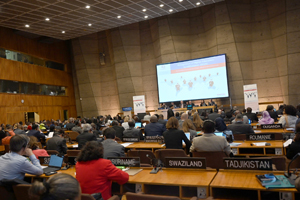AACRAO attends UNESCO meeting in Paris
Jan 7, 2019, 20:28 PM
legacy id :
Summary :
The goal of the global convention is to facilitate inter-regional mobility, build and reinforce the regional conventions, and serve higher education into the future.
Url :
The United Nations Educational, Scientific, and Cultural Organization (UNESCO) recently held its Intergovernmental Meeting on the Global Convention on the Recognition of Higher Education Qualifications at the UNESCO headquarters in Paris December 5-7. AACRAO with its long history of work on international education credentials and student mobility was invited to serve as an observer. Mike Reilly, AACRAO’s Executive Director, attended on behalf of AACRAO.
UNESCO’s work on a global convention on the recognition of education qualifications dates to the first generation of regional conventions on recognition begun in 1974. The Latin American and the Caribbean Regional Convention was ratified in 1974 followed by the Arab States in 1978, Europe and North America in 1979, Africa in 1981, and Asia and the Pacific in 1983. These regional conventions served higher education well for many years, but changing learning paradigms, diversification of educational providers, demographic changes, and increased student mobility led to a need to update the conventions.
The second generation of regional conventions on recognition began with the Lisbon Convention in 1997, followed by the Tokyo Convention in 2011 and the Addis Convention in 2014. Regional conventions in the Arab States and Latin America and the Caribbean are anticipated to be ratified some time in 2019.
With ever-increasing global student mobility -- the number of students studying abroad is expected to double by 2025 -- the notion of a global convention on the recognition of educational qualifications emerged. The goal of the global convention is to facilitate inter-regional mobility, build and reinforce the regional conventions, and serve higher education into the future. Major tenets of the draft convention are the value of diversity and the concept of substantial difference, recognition of partial studies, and recognition for general employment. The draft convention also calls for the recognition of qualifications held by refugees and displaced persons, and important issue for AACRAO and its work on the Article 26 Backpack Project.
Work began on the global convention in 2011 with hopes of culminating with ratification at the UNESCO General Conference in November of 2019. The work that began in Paris in December will be resumed again in Paris in March with the goal of preparing the convention for ratification in November. “With the United States choosing not to participate in this process, organizations like AACRAO can play an important role in helping to keep the higher education community in the U.S. informed” said Mike Reilly. “This convention will impact U.S higher education in significant ways whether the U.S. is a signatory to the convention or not.”
Categories :
- AACRAO News
- International Admissions and Credential Evaluation
- International Education
